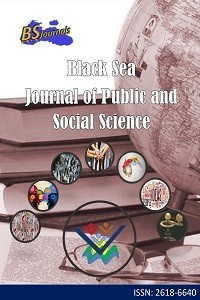Sustainable Agriculture in Turkey: Potential, Obstacles and Recommendations
Sustainable Agriculture in Turkey: Potential, Obstacles and Recommendations
Natural resources are threatened to meet needing of increased population. Sustainable agricultural production practices are required to provide activities against global warming, energy use and water scarcity etc. This study is aim to put current situation and potential of Turkish Agriculture for sustainability, reveal obstacles and present recommendations. The information collected is presented by strengths, weaknesses, opportunities, threats (SWOT) analysis approach and some recommendations are made. In terms of sustainability Turkey has some strengths (wide agricultural and ecological zones, biological diversity, high numbers and quality research institutes, increased levels of education and awareness of producers) and opportunities (supports for organic agriculture and biological control, New trends towards consuming natural products etc.) for sustainable agriculture. At the same time, there are some weaknesses (low competitiveness, large numbers of small farmers and wide chemical input use) and threats (lack of knowledge about sustainability in the society, agricultural subsidies and inexpensive food demand etc.). Government supports, education and some additional projects can be useful to expand sustainable production systems
Keywords:
SWOT analysis, Sustainable agriculture, Turkey,
___
- Cakmak H, Dudu H, Saracoglu S. 2009. Climate change and agriculture in Turkey: A Cge Modeling Approach. Econ Anadolu 2009: Anadolu International Conference in Economics. June 17-19, Eskişehir, Turkey.
- Gokalp Z, Cakmak B. 2016. Agricultural water management in Turkey: past-present-future. Current Trend Natur Sci, 5 (9): 133-138.
- Gurel E, Tat M. 2017. SWOT analysis: A theoretical review. J Inter Soc Res, 10 (51): 994-1006.
- HLPE, 2016. Sustainable agricultural development for food security and nutrition: what roles for livestock? A report by the High Level Panel of Experts on Food Security and Nutrition of the Committee on World Food Security, Rome.
- Karas E, Oguz İ. 2017. Evaluation of soil erosion and sustainable land use management in the Sarısu Basin. Turkish J Agri Food Sci Technol, 5(8): 864-872.
- MEF, 2007. The national diversity strategy and action plan. Ministry of Environment and Forestry General Directorate of Nature Conservation and National Parks. Department of Nature Conservation. National Focal Point of Convention on Biological Diversity. Ankara. 176 pages.
- MAF, Ministry of Agriculture and Forestry, 2018. https://www.tarim.gov.tr (Available at: 01.09.2018).
- Menalled F, Bass T, Buschena D, Cash D, Malone M, Maxwell B, McVay K, Miller P, Soto R. 2008. An Introduction to the principles and practices of sustainable farming. https://www.researchgate.net/publication/237634289_An_Introduction_to_the_Principles_and_Practices_of_Sustainable_Farming (Available at: 01.09.2018).
- SAI Platform, 2018. Short guide the sustainable agriculture. http://www.saiplatform.org/uploads/Library/short_guide_to_sa_-_final%5B1%5D.pdf (Available at: 01.09.2018).
- UN, 2017. World population prospects 2017. https://esa.un.org/unpd/wpp/ (Available at: 01.09.2018).
- Thogersen J, Schrader U. 2012. From knowledge to action-new paths towards sustainable consumption. J Consum Policy, 35(1):1-5.
- Thompson AA, Strickland AJ, Gamble JE. 2007. Crafting and executing strategy-concepts and cases, (15th Edition), USA: McGrawHill/Irwin.
- Truscott L, Aranda D, Nagarajan P, Tovignan S, Travaglini AL. 2009. A snapshot of crop diversification in organic cotton farms. Discussion paper, Soil Association, https://www.sustainabilityxchange.info/filesagri/Crop%20diversification.pdf (Available at: 01.09.2018).
- WTC, 2008. Biodiversity and Agriculture: Safeguarding Biodiversity and Securing Food for the World. World Trade Centre. Secretariat of the Convention on Biological Diversity. Montreal, 56 pages.
- Worldometers, 2018. Turkey Population.http://www.worldometers.info/world-population/turkeypopulation/ (Available at: 31.08.2018).
- YOK, 2018. Council of Higher Education, 2018.https://istatistik.yok.gov.tr/ (Available at: 01.09.2018).
- Yayın Aralığı: Yıllık
- Başlangıç: 2018
- Yayıncı: Sevtap TIRINK
Sayıdaki Diğer Makaleler
Evaluation of Almond Marketing Organization in the Eastern Mediterranean Region of Turkey
6360 SAYILI YASA SONRASI BÜYÜKŞEHİRLERDE SOSYAL ARAŞTIRMA YAPMANIN ZORLUKLARI
Local Agricultural Markets for Sustainable Rural Development in Iran
GÜLİSTAN TERCÜMESİ İLE DÎVÂNU LUGÂTİ’T TÜRK’TE ORTAK KAVRAMA GÖNDERME YAPAN EŞDEĞER ATASÖZLERİ
Sustainable Agriculture in Turkey: Potential, Obstacles and Recommendations
Arzu SEÇER, Mutlu BULUT, Mustafa BOĞA
SHEEPNET: KUZULARIN HAYATTA KALABİLMELERİNİ ARTIRMAK İÇİN KUZULAYAN KOYUNLARIN YÖNETİMİ
